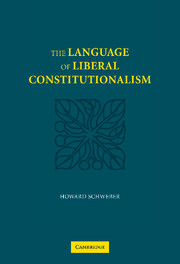Book contents
- Frontmatter
- Contents
- Introduction
- 1 The Search for Sovereignty: Law, Language, and the Beginnings of Modern Constitutionalism
- 2 Consent How? Challenges to Lockean Constitutionalism
- 3 Constitutional Language and the Possibility of Binding Commitments
- 4 Consent to What? Exclusivity and Completeness in Constitutional and Legal Language
- 5 The Question of Substance: Morality, Law, and Constitutional Legitimacy
- 6 The Defense of Constitutional Language
- Bibliography
- Index
3 - Constitutional Language and the Possibility of Binding Commitments
Published online by Cambridge University Press: 17 July 2009
- Frontmatter
- Contents
- Introduction
- 1 The Search for Sovereignty: Law, Language, and the Beginnings of Modern Constitutionalism
- 2 Consent How? Challenges to Lockean Constitutionalism
- 3 Constitutional Language and the Possibility of Binding Commitments
- 4 Consent to What? Exclusivity and Completeness in Constitutional and Legal Language
- 5 The Question of Substance: Morality, Law, and Constitutional Legitimacy
- 6 The Defense of Constitutional Language
- Bibliography
- Index
Summary
At this point in the argument, we are presented with two fundamental propositions. First, that the initial commitment is to the creation of a language, and, second, that the commitment to constitutional language binds ourselves and future actors to employ that language for purposes of constitutional discourse. But the idea of a binding commitment to employ constitutional language raises the problem of “precommitment.” How can we justify asserting that a commitment entered into long ago continues to bind actors today facing situations that were not contemplated at the earlier time? To get at that question, some further reflections on the relationship between constitutional language and the constitutional text are required.
Chapter 2 considered various challenges to the basic model of Lockean constitutionalism, in particular the idea that constitutional legitimacy can be grounded in a demonstration of sovereignty created by consent. These objections were arrayed around a traditional understanding of the sovereign as lawgiver, based on the adoption of an anthropomorphic metaphor of the state, that continues to play a prominent role in modern discussions of sovereignty and its relationship to the problem of precommitment. In response, an examination of the idea of constitutional authorship and its relation to self-sovereignty, suggested a more subtle description in which self-sovereignty emerged as the authority to engage in collective self-authorship. The question of under what conditions constitutional consent is possible (“Consent How?”) therefore became the question of the conditions under which a people can exercise self-sovereignty as self-authorship.
- Type
- Chapter
- Information
- The Language of Liberal Constitutionalism , pp. 135 - 196Publisher: Cambridge University PressPrint publication year: 2007

